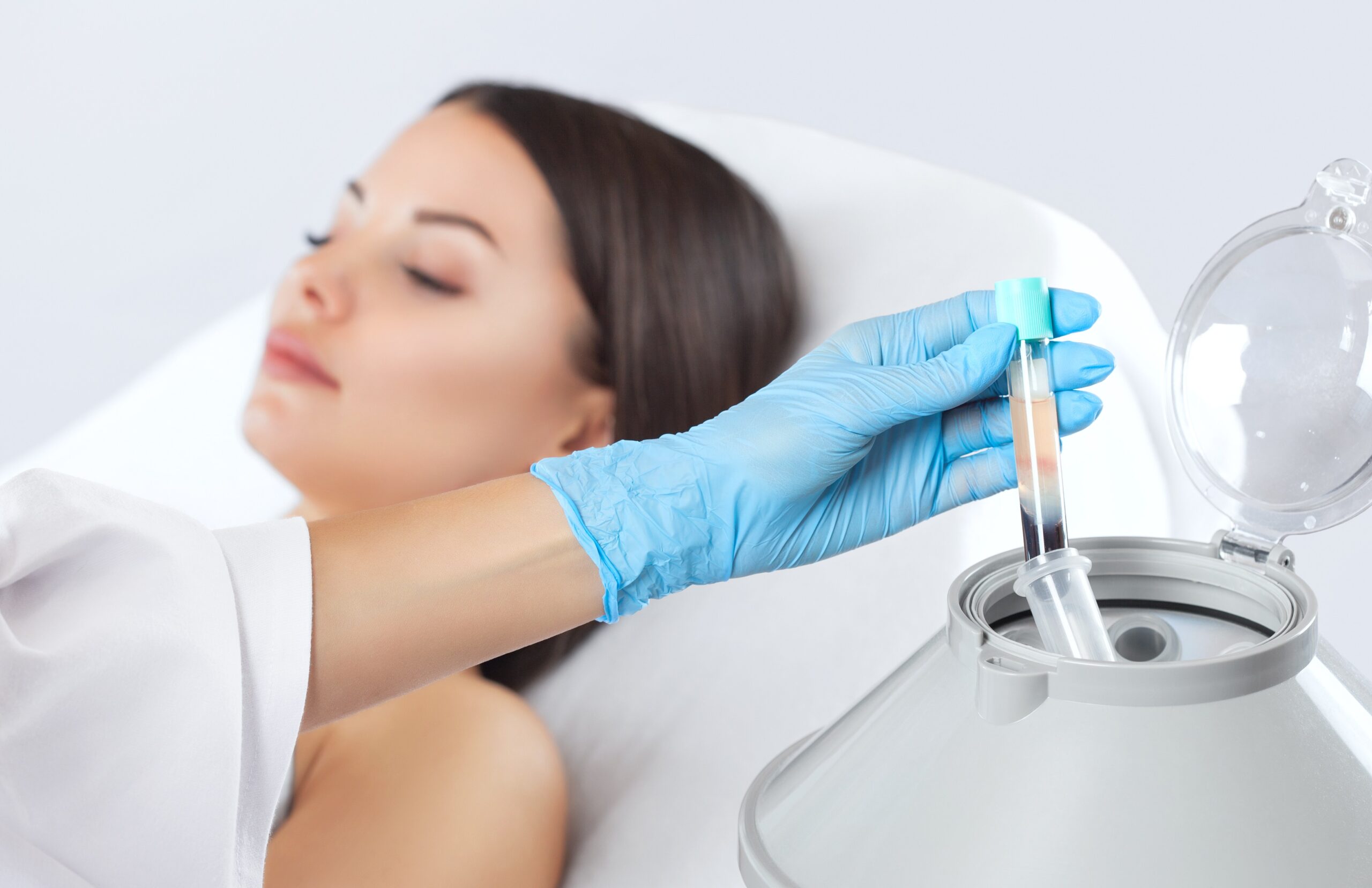PRP Treatment Process at Anara Medspa
Anara Medspa’s PRP treatment in NJ is designed to harness the natural healing powers of your own body to rejuvenate and restore. This cutting-edge treatment begins with a simple blood draw from the patient. The collected blood is then spun in a centrifuge, a process that separates the platelets to create a concentrated plasma. This platelet-rich plasma, packed with growth factors, is then meticulously injected or microneedled back into the targeted areas of the body or face. The PRP works by stimulating collagen production, promoting tissue repair, improving blood flow and accelerating the regeneration process. Ideal for addressing concerns ranging from hair loss and skin rejuvenation to the healing of injuries, PRP treatments at Anara Medspa offer a minimally invasive option with compelling results. This personalized approach ensures that each patient receives a treatment tailored to their specific needs, maximizing the benefits of PRP therapy.
Recovery and Aftercare for PRP Treatments by Anara Specialists
At Anara Medspa, a skin and laser center of NJ, recovery and aftercare following PRP treatments are meticulously guided by our specialists to ensure optimal outcomes and patient comfort. Post-treatment, patients may experience mild swelling, redness, or bruising at the injection sites, which typically subsides within a few days. Specialists at Anara Medspa advise keeping the treated area clean and applying a gentle moisturizer or serum to promote healing. Patients are encouraged to avoid direct sunlight and use a broad-spectrum sunscreen to protect the treated area. Strenuous activities and alcohol consumption should be avoided for at least 48-72 hours post-treatment. To enhance the treatment’s effectiveness, following a healthy diet, staying hydrated, and adhering to a skincare regimen recommended by our specialists are crucial. With these aftercare steps, PRP therapy at Anara Medspa promotes a swift recovery, allowing patients to quickly resume their daily routines while enjoying the rejuvenating effects of their treatment.
Frequently Asked Questions about PRP Procedures
The success rate of PRP hair loss treatment varies widely due to multiple influencing factors, such as genetics, the specific type of hair loss, hormone levels, stress, acute illnesses, and medications. It’s difficult to pinpoint a specific success rate because of these variables. Generally, it has been observed that women may experience quicker positive outcomes compared to men. The typical treatment protocol involves initially undergoing 4-6 sessions spaced every 4-6 weeks apart, followed by maintenance sessions 1-3 times a year to sustain the results.
The cost of PRP injection treatments can fluctuate significantly depending on various factors, including the quality of the equipment used (such as the type of kits and centrifuge for platelet separation and harvesting, and whether it is single or double spin system), the complexity and labor intensity of the procedure, and the duration of the treatment. Given the bespoke nature of PRP therapy, where each procedure is tailored to the individual’s specific needs, it’s challenging to provide a one-size-fits-all cost estimate. To get a precise understanding of what a PRP treatment might cost for you, and to determine if it’s the appropriate solution for your needs, scheduling a consultation is highly recommended. During this consultation, your specific situation can be evaluated, and a more accurate cost estimate provided.
PRP for hair loss is a therapeutic option for men and women experiencing hair thinning or loss. It involves drawing a patient’s blood, processing it to concentrate platelets and growth factors, and then injecting pr microneedling this enriched plasma into the scalp. This process is believed to stimulate the hair follicles, promoting new hair growth and increasing the thickness of the hair shaft. This non-surgical approach leverages the body’s natural healing mechanisms to encourage hair regrowth and is considered for those seeking alternatives to traditional hair loss treatments. It is recommended to continue PRP injection treatment even after hair transplant to keep the transplanted hair healthy and viable for a long time.
PRP (Platelet-Rich Plasma) treatment for the face, commonly known as PRP Facial or “vampire facial,” is a cosmetic procedure designed to rejuvenate the skin. It involves drawing a small amount of the patient’s blood, processing it to isolate the plasma rich in platelets and growth factors, and then microneedling or injecting this concentrated plasma back into the face. The goal is to stimulate collagen production, promote cell turnover, and accelerate the skin’s natural healing process. This results in improved skin texture and tone, reduced fine lines and wrinkles, and a more youthful overall appearance.
As we can expect, blood has to be drawn with a needle and PRP itself is injected or microneedled to the area. To alleviate discomfort we can use numbing cream or laughing gas.
No cosmetic treatments can give permanent results except for surgical procedures like Rhinoplasty, blepharoplasty etc.
- We can address this question by going over who can not have PRP treatments. RP (Platelet-Rich Plasma) injection treatment, while widely regarded for its healing and regenerative capabilities, is not suitable for everyone. There are specific contraindications to be aware of, including:
- Platelet Dysfunction Syndromes: Conditions affecting platelet function can impair the effectiveness of PRP treatments.
- Critical Thrombocytopenia: Extremely low platelet counts pose a risk during PRP treatment.
- Hemodynamic Instability: Individuals with unstable blood pressure or other circulatory issues may not be suitable candidates.
- Anticoagulation Therapy: Patients on blood thinners might experience complications due to bleeding risks.
- Acute and Chronic Infections
- Cancer: Patients with cancer, especially hematopoietic or of the blood, are typically advised against PRP due to potential risks of stimulating cancerous cells.
- Chronic Liver Disease: Impaired liver function can affect the body’s ability to process and benefit from PRP.
- Recent Fever or Illness: Being unwell can impact the body’s response to PRP.
It’s important for individuals considering PRP treatment to consult with a physician provider to thoroughly assess their medical history and current health status. This consultation helps to ensure the safety and effectiveness of PRP treatment for each individual patient.


